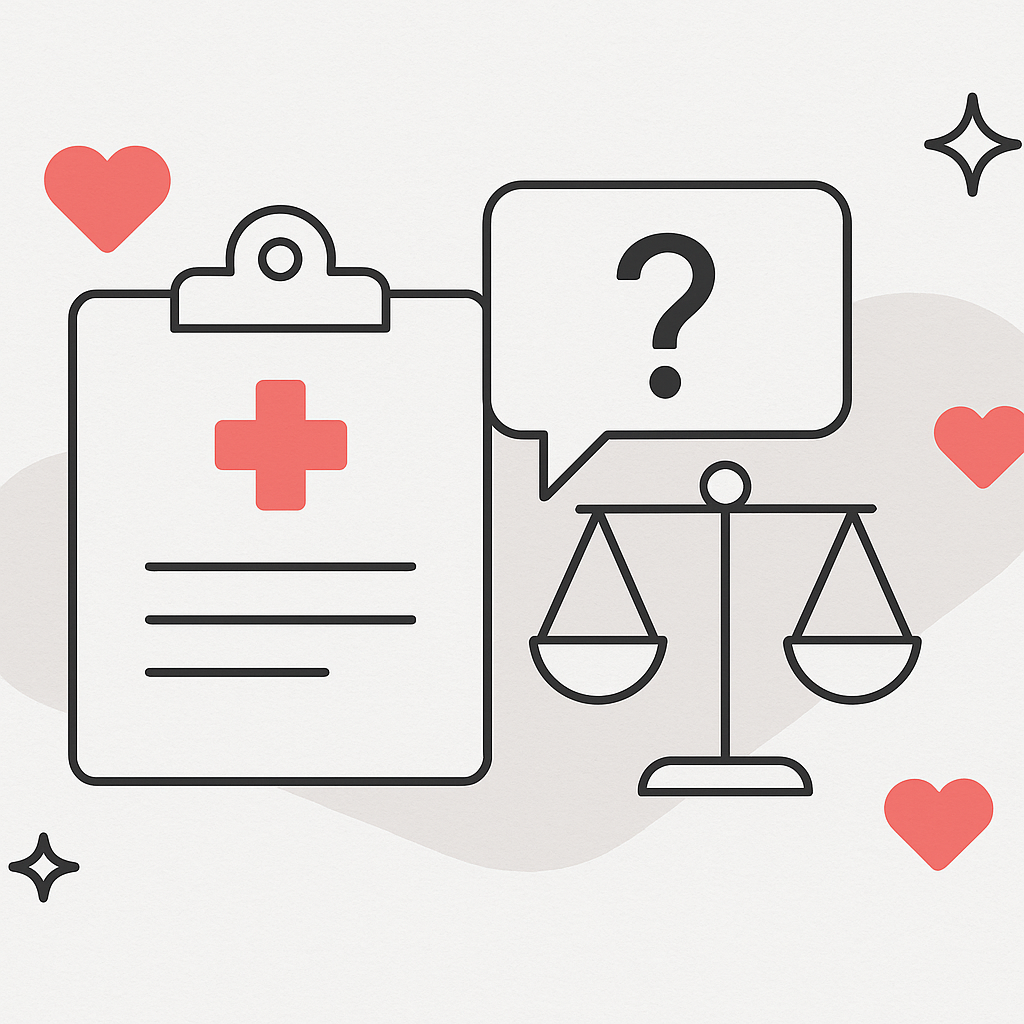Master your UCAT preparation with our expert revision guide covering all five subtests, effective time management strategies, and a customisable 8-week study plan for optimal performance.

Master the core ethical principles for medical school interviews with practical scenarios, frameworks, and sample answers to help you navigate challenging ethical questions with confidence.
Medical ethics questions are a cornerstone of medical school interviews, designed to assess your understanding of the moral principles that guide healthcare decisions. Admissions tutors want to see that you can think critically about complex situations, balance competing interests, and uphold the values of the medical profession.
These questions aren't designed to catch you out but to explore your reasoning process and values. There are rarely perfect answers, but there are thoughtful, well-structured approaches that demonstrate your suitability for a career in medicine.
The cornerstone of medical ethics is often described using four key principles:
When tackling ethical scenarios, consider how these principles apply, but recognize they often conflict with each other. Your ability to navigate these tensions is what interviewers are looking for.
Beyond the four pillars, familiarize yourself with these important concepts:
When presented with an ethical scenario, use this framework to organize your thoughts:
Be prepared to discuss scenarios like:
Question: "A 15-year-old discloses they're sexually active and requests contraception without their parents knowing. How would you handle this?"
Strong response: "This scenario involves balancing confidentiality with the welfare of a minor. First, I'd assess the patient's Gillick competence—their ability to understand the treatment and implications. If they demonstrate sufficient maturity, they have a right to confidentiality, even from parents. I'd provide appropriate contraceptive advice while discussing healthy relationships and ensuring they're not at risk of exploitation.
I'd encourage them to involve their parents, explaining the benefits of family support, but would respect their confidentiality if they refused. I'd ensure they understand the limits of confidentiality—that if I became aware of serious harm or abuse, I would need to involve appropriate authorities. Throughout, I'd document my assessment of their competence and the rationale for my decisions, and seek senior guidance if unsure."
By preparing thoroughly for ethical discussions, you'll demonstrate not only your understanding of these crucial principles but also your readiness to join a profession where such decisions are made daily.

Master your UCAT preparation with our expert revision guide covering all five subtests, effective time management strategies, and a customisable 8-week study plan for optimal performance.

Learn effective communication techniques to excel in medical and dental school interviews. Discover practical strategies to articulate your thoughts clearly and connect with interviewers.

Master the core ethical principles for medical school interviews with practical scenarios, frameworks, and sample answers to help you navigate challenging ethical questions with confidence.

Learn how to effectively reflect on your personal statement before submission, identifying weaknesses and enhancing your narrative to create a compelling application that truly represents you.
Be a part of our community and never miss an update! Oh and, sign up for our newsletter – essential insights, zero fluff.
We'll leave no stone unturned!
Be reminded about every single event
{
"@context": "http://schema.org/",
"@type": "Article",
"name": "Medology: Medical Ethics In Interviews Guide",
"image": ["Image URL"],
"author": {
"@type": "Person",
"name": "Dr. Sarah Johnson",
"brand": "Medology",
"jobTitle": "Former Medical School Admissions Tutor",
"image": "https://www.medology.co.uk/images/dr-johnson.jpg"
},
"publisher": {
"@type": "Organization",
"name": "Medology",
"logo": {
"@type": "ImageObject",
"url": "https://www.medology.co.uk/images/logo.png",
"width": 600,
"height": 60
}
},
"datePublished": "2023-05-20",
"dateModified": "2023-05-20",
"description": "Master medical ethics questions in your medical school interviews with our comprehensive guide on the four pillars, common scenarios, and proven frameworks for ethical reasoning.",
"keywords": "medical ethics interview, medical school interviews, four pillars of ethics, ethical scenarios medicine, medical interview preparation, autonomy beneficence, medical ethics framework",
"articleSection": "Interviews",
"wordCount": 1250,
"timeRequired": "PT6M",
"mainEntity": [
{
"@type": "Question",
"name": "What are the four pillars of medical ethics?",
"acceptedAnswer": {
"@type": "Answer",
"text": "The four pillars of medical ethics are Autonomy (respecting patients' right to make their own decisions), Beneficence (acting in the patient's best interest), Non-maleficence (avoiding harm), and Justice (fair distribution of resources and treatment)."
}
},
{
"@type": "Question",
"name": "How should I structure my answer to an ethical scenario?",
"acceptedAnswer": {
"@type": "Answer",
"text": "Structure your answer by first identifying the ethical principles involved, analyzing the conflict between them, considering different perspectives, discussing potential actions and their consequences, and finally stating your balanced conclusion with justification."
}
},
{
"@type": "Question",
"name": "What common ethical scenarios come up in medical interviews?",
"acceptedAnswer": {
"@type": "Answer",
"text": "Common scenarios include confidentiality breaches, consent issues, resource allocation, end-of-life care decisions, treating minors, religious conflicts with treatment, and balancing patient wishes against clinical recommendations."
}
},
{
"@type": "Question",
"name": "How important is patient autonomy in medical ethics?",
"acceptedAnswer": {
"@type": "Answer",
"text": "Patient autonomy is fundamental in modern medical ethics. It recognizes patients' right to make informed decisions about their own healthcare, even when those decisions might seem unwise. However, autonomy can sometimes conflict with other ethical principles."
}
},
{
"@type": "Question",
"name": "What are the key principles of medical confidentiality?",
"acceptedAnswer": {
"@type": "Answer",
"text": "Medical confidentiality requires protecting patients' private information. Key principles include sharing information only with the healthcare team involved in care, obtaining consent before disclosure, and understanding the limited exceptions where confidentiality may be breached for public interest."
}
}
],
"url": "https://www.medology.co.uk/resources/medical-ethics-in-interviews",
"educationalLevel": "Undergraduate",
"educationalUse": "Interview preparation",
"teaches": "Medical ethics principles and application",
"audience": {
"@type": "Audience",
"audienceType": "Medical and Dental School Applicants"
},
"aggregateRating": {
"@type": "AggregateRating",
"ratingValue": "4.8",
"ratingCount": "137"
},
"review": [
{
"@type": "Review",
"author": "Ravi Sharma",
"datePublished": "2023-05-02",
"reviewBody": "This ethics guide was invaluable for my interviews. The frameworks helped me approach complex scenarios with confidence, and I felt prepared for every ethical question thrown at me. My Cambridge interviewer specifically complimented my ethical reasoning!",
"name": "Comprehensive Ethics Preparation",
"reviewRating": {
"@type": "Rating",
"ratingValue": "5"
}
},
{
"@type": "Review",
"author": "Mei-Ling Chen",
"datePublished": "2023-05-05",
"reviewBody": "As an international student, I was unfamiliar with UK medical ethics. This guide broke down the four pillars clearly and provided practical examples that helped me understand cultural nuances. The structure for answering ethical questions was particularly helpful.",
"name": "Perfect for International Applicants",
"reviewRating": {
"@type": "Rating",
"ratingValue": "5"
}
},
{
"@type": "Review",
"author": "Ibrahim Al-Mansour",
"datePublished": "2023-05-10",
"reviewBody": "The section on balancing competing ethical principles was eye-opening. I used to give very one-sided answers, but this guide taught me how to show mature reasoning by acknowledging multiple perspectives. Got offers from 3 of my 4 choices!",
"name": "Transformed My Interview Approach",
"reviewRating": {
"@type": "Rating",
"ratingValue": "4"
}
},
{
"@type": "Review",
"author": "Chioma Nwachukwu",
"datePublished": "2023-05-15",
"reviewBody": "The real-life examples and practice scenarios helped me apply ethical principles in context rather than just memorizing them. My interviewers seemed impressed by how I could relate the four pillars to practical situations. Well worth the read!",
"name": "Practical Application of Theory",
"reviewRating": {
"@type": "Rating",
"ratingValue": "5"
}
},
{
"@type": "Review",
"author": "Francisco Herrera",
"datePublished": "2023-05-18",
"reviewBody": "I was particularly nervous about ethics questions as they can be unpredictable. This guide gave me a structured approach that works for any scenario. The tips on how to avoid common pitfalls in ethical reasoning were especially valuable.",
"name": "Confidence-Building Framework",
"reviewRating": {
"@type": "Rating",
"ratingValue": "5"
}
}
]
}
{
"@context": "https://schema.org",
"@type": "FAQPage",
"mainEntity": [
{
"@type": "Question",
"name": "How should I approach ethical scenarios in medical school interviews?",
"acceptedAnswer": {
"@type": "Answer",
"text": "Rather than memorizing rigid frameworks, understand the key ethical principles and practice applying them flexibly. Having a structured approach (identifying principles at stake, considering perspectives, weighing options, and making a reasoned conclusion) will help organize your thoughts under pressure. Interviewers value authentic reasoning over rehearsed answers."
}
},
{
"@type": "Question",
"name": "What are the most frequently encountered ethical topics in medicine interviews?",
"acceptedAnswer": {
"@type": "Answer",
"text": "Common scenarios involve patient confidentiality, informed consent, resource allocation, truth-telling, and treating patients with harmful habits. Scenarios involving young people, mental capacity, and end-of-life care are particularly popular as they touch on multiple ethical dimensions and challenge applicants to balance competing principles."
}
},
{
"@type": "Question",
"name": "What if I'm asked about a controversial ethical issue during my interview?",
"acceptedAnswer": {
"@type": "Answer",
"text": "Approach controversial topics by acknowledging multiple perspectives, demonstrating awareness of complexity, and focusing on patient-centered care. Avoid making absolute statements or letting personal biases dominate. Show that you understand the ethical principles involved and can balance competing considerations with sensitivity and reason."
}
},
{
"@type": "Question",
"name": "Should I study specific ethical frameworks before medical interviews?",
"acceptedAnswer": {
"@type": "Answer",
"text": "While understanding basic ethical principles is important, focus on developing flexible thinking rather than memorizing rigid frameworks. Familiarize yourself with concepts like autonomy, beneficence, non-maleficence, and justice, but practice applying them to various scenarios. This demonstrates genuine ethical reasoning rather than recitation of memorized material."
}
},
{
"@type": "Question",
"name": "How do I handle ethical questions when I don't know the relevant laws or guidelines?",
"acceptedAnswer": {
"@type": "Answer",
"text": "If you're unsure about specific laws or guidelines, acknowledge this openly. Focus on the ethical principles you do understand, demonstrate your reasoning process, and mention that in practice you would seek guidance from seniors or consult relevant professional guidelines. Honesty about the limits of your knowledge is better than guessing incorrectly."
}
}
]
}